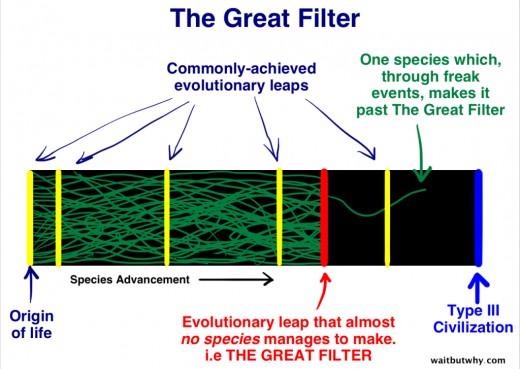The Great Filter

Fermi Paradox
The Fermi Paradox is a concept originally brought to life by Italian Physicist Enrico Fermi, the man credited with creating the first nuclear reactor. It was offered up as an explanation, although actually creating many more questions, as to why we have not encountered intelligent extraterrestrial life on Earth. Due to the extreme likelihood of life elsewhere in the universe, even intelligent life, Fermi wondered if there was a reason we haven't seen or experienced any evidence of life off of Earth. (Rumor has it this was just a side comment to his peers at lunch one day). He figured there must be some sort of obstacle preventing either interstellar travel, or species survival. While offering up many explanations, this article chooses to focus on a single aspect of his theory, called The Great Filter.
The Great Filter
The Great Filter is the point in the evolutionary process for a species in which it is statistically unlikely, almost impossible, for the species to continue growing and expanding in any capacity. This could be from lack of sufficient resources, lack of energy, biological reasons, or even self-destruction. Somewhere along the line, from the first emergence of life on a planet to becoming a species that has ensured it's own permanent survival, there must be one or more "steps" that are preventing life from continuing further.
Here's what Fermi's Paradox defines as the steps to reach that point of ensuring our survival:
- The right solar system (needs to be able to sustain life)
- Reproductive capabilities (RNA)
- Simple single-celled organisms (prokaryotes)
- Complex single-celled organisms (eukaryotes and archaea)
- Sexual Reproduction
- Multi-celled organisms
- Tool-using beings with large brains
- Where we are now
- Interplanetary Colonization
Where we are now is hard to pinpoint, as it is more like we are still in the throes of step 7. The only thing that sets us apart from just "tool-using beings" is our rate of development of new tools. Technology is being advanced every single day at a rate that is unheard of in our admittedly brief history. But we are still a long way off from achieving that last step. If the Great Filter is in front of us, it is rapidly approaching and we will encounter it before the next step of our evolution.
This paints a potentially bleak picture for mankind. If we have made it this far relatively easily, we have yet to encounter this impossible step.
Never Tell Me The Odds
This paints a potentially bleak picture for mankind. If we have made it this far relatively easily, we have yet to encounter this impossible step. If it is behind us, at say, the stage where multicellular life emerges, then we can either rest easy knowing the hard part's behind us, OR, get ready for another evolutionary leap of faith.
Our evolution, while struggling at times, has never failed to achieve success. We luckily came to be on a planet that is capable of sustaining life, with life emerging numerous times before us. Starting with single-celled organisms, our big blue home eventually created multi-cellular beings several times before making one that achieved intelligence. Our ancestors developed the use of tools, which paved the way to where we are now. This implies that the Filter is still in front of us. The next step for us is to colonize nearby planets, ensuring our survival in case of an extinctual event on Earth. If we achieve this, we pass the Great Filter. However, the reason that this must be so difficult is quite apparent. We lack the ability to harness as much energy as we need to sustain that way of life. Our current way of life is warming up the planet at a dangerous rate. We lack the coordination as a species to achieve our full potential, as we are constantly plagued with political turmoil and war. The development of nuclear warheads threatens our entire species' survival, and with tensions rising globally all the time, it is unclear as to whether we can make this leap in technology and engineering before our doom.
This is still assuming that it's possible to achieve interstellar travel. There is still the possibility, arguably the probability, that it is not physically possible to reach that level of transportation. This could be due to biological reasons, like our bodies being unable to handle it, or simply due to the laws of physics, and achieving that speed for a craft a large size simply can't happen due to energy or material restrictions. If that's the case, much of Fermi's argument becomes invalid.

It's Not All Bad
Despite most of what I've been hinting at this entire article, things aren't all negative for humanity. It's entirely possible that the filter is behind us, and it's just a matter of us developing the right technology to make our way to Mars. Maybe, despite numbers suggesting otherwise, we really are the first intelligent species in the universe, or at least in this general area of the Milky Way. We've been able to make it this far, and our instinct to find solutions in our times of greatest need are what makes us human. I have faith that we will pass this Great Filter, and beyond it we'll find a whole new definition of what's possible.





